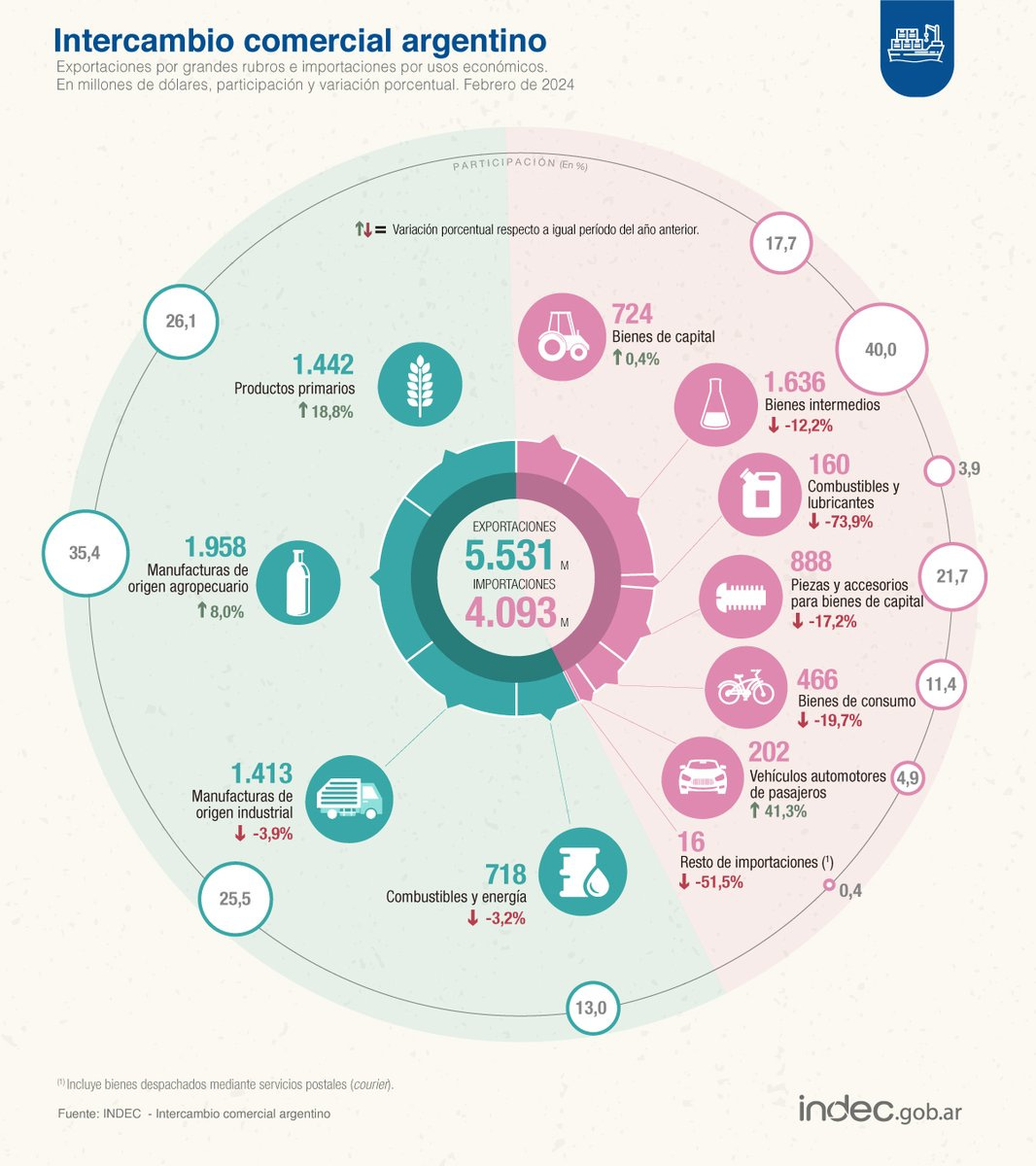The First 100 Days of Milei
"All this will not be finished in the first one hundred days."
Welcome Avatar! This week marked the first 100 days of the Milei government in Argentina. What has the Libertarian government accomplished so far, and what’s in store for the next few months? Let’s dig in.
“All this will not be finished in the first one hundred days. Nor will it be finished in the first one thousand days... nor even perhaps in our lifetime on this planet. But let us begin.”
— John F. Kennedy, 1961
Milei’s Main Objectives
The main objective Milei set for himself at the beginning of his administration was always clear: do everything necessary to bring down inflation, stop printing and begin a deregulation process that reverses the deterioration of the economy.
Some progress has exceeded expectations, like the fiscal surplus in the first two months of the year.
This combined with lower MoM inflation, even after taking off price controls and other Peronist bandaids that have maintained price distortions for over a decade, have been unsuspectedly quick results of the fiscal and monetary policy put in place by el peluca.
These were achieved thanks to strong cuts in transfers to the provinces and a recomposition of salaries and social benefits below inflation. The Government is now betting on achieving a single-digit CPI that will allow the decline in economic activity to be reversed starting in the second half of the year.
The delay in import payments and the drop in activity also caused the trade balance to recover, which generated the return of a twin surplus in February.

The economic team, headed by Luis Caputo, agreed on new goals with the IMF and 'reactivated' the extended facilities program after the deviations at the end of Sergio Massa's administration.
Caputo indicated there’s a new IMF agreement on the horizon, and Milei said that in order to lift the current foreign exchange restrictions, he would only need an additional $15 billion.
As we’ve discussed in The Return of the Jaguar, one of the expectations for the coming months is that dollar restrictions will gradually be lifted, together with those on imports.
Even though the market hopes for another devaluation before the restrictions are gone and rates are combined, that might not be the case if the Milei admin is able to secure more funds to accelerate the opening.
BCRA Reserves
So far in March, dollar purchases by the Central Bank have accumulated almost US$2 billion. At the end of this month, the BCRA net reserves will likely be showing green numbers again for the first time since the record low of close to -$11 billion.
The previous administration left debts in dollars and yuan, and peso liabilities remunerated at a 133% rate, which were printing an additional monetary base every 1.8 months.
This former LELIQ debt bomb is still being deactivated through a reduction of rates and the initial devaluation at the start of Milei’s presidency, but the main risk of hyperinflation is now a thing of the past.
Patience you must have, my young Padawan.
The winner of the 1971 Nobel Prize in Economics, Simon Kuznets, once famously stated there were four types of economies in the world: developed, undeveloped, Japan and Argentina.
To think that Argentina could change in 100 days would be ludicrous, and it will take many decades to undo the damage of the last 100 years.
Autist note: if you want to read more about the downfall of Argentina over time, this article explains how it happened:
Depending on the circumstances and the way in which pro-market policies are pushed, they can also end in tears and bring even more left-wing Peronism.
This is exactly what happened after Menem’s pro-market presidencies. Despite low inflation and wider available credit, unemployment was high — especially at the end of the second term.
The 1998 Tequila Banking crisis had its impact on Argentina as well. This eventually culminated in the 2001 crisis that gave rise to Kirchnerism, which has been the most Marxist version of Peronism to date and has governed for the better part of this century.

Kirchnerism has been less vocal since Milei started his government, and seems to be blocking his initiatives in silence.
There has not been a clear new leader of the movement since presidential candidate Massa moved to Greylock Capital, and power is ripe for the taking as soon as people become impatient enough with Milei’s market reforms and don’t see positive effects soon.
Remember: the best trick Kirchnerism ever pulled was convincing people it was finished — during Macri’s presidency (2015-2019) — just to come back with a vengeance during the next elections. It seems to be following that same playbook now.
Social Tensions
The previous administration’s spending spree with helicopter money combined with Milei’s “zero deficit” context, results in salaries very much lagging behind inflation. Lower purchasing power has had an impact on consumption and activity, and some industry sectors are already working at half capacity (54% in January).
Employment data is also deteriorating, with layoffs both in the public and private sector. The result is an increase in poverty, currently estimated at 57%.
In short: a good cocktail for increased social tensions.
After the initial protests at the Congress building during Milei’s Omnibus Law initiative, there has been a steady crescendo in demonstrations in general.
This week, the water cannon dye was used for the first time on protestors who were blocking transit, and apparently the government is now working on a bill for jail sentences tied to road blocking.
In most mainstream media like this Aljazeera article, you will be able to read articles along the following lines:
According to Eduardo Barcesat, a professor of law at the University of Buenos Aires, Milei’s choice to attack the governors could backfire. “By taking a confrontational stance with governors, he’s made his position even weaker in Congress, especially with centrist legislators.”
Over the coming months, “the president will hope to galvanise support around his policies”, Barcesat said. “If shock therapy takes off and delivers results, especially around inflation, he believes he can increase support,” he said. “So far, this hasn’t been remotely achieved.”
Inflation rocketed to 276 percent in February, principally due to recent peso depreciations. Elsewhere, the poverty rate hit 57.4 percent in January, its highest in 20 years. Rising tensions among workers and unions have provoked high numbers of strikes and protests in recent weeks.
For Matias Vernengo, the former central bank official, “Milei is taking a huge gamble with the Argentinian people. If he doesn’t deliver results soon, I think that protests will start to turn violent. Things could get ugly.”
It’s not that there’s not a level of truth to this, especially the last part. It is a prophecy that most government opponents will make sure to fulfil as soon as the time is ripe and they feel there is enough support from the rest of the population — the same thing happened in 2001, when president De la Rua had to flee by helicopter after days of riots.
As I’ve mentioned numerous times, positive effects will have to start manifesting sooner rather than later before people run out of patience.
But so far, even opposition channels are having a hard time interviewing people on the street in the hope that have already lost patience after Milei’s first 100 days:
There was not one negative review from the people interviewed in this segment, and an important detail is that this channel is owned by Milei opponents.
One of the latest surveys also indicated that despite the austerity measures, Milei practically maintains the same level of acceptance as during the runoff.
This is very positive and perhaps unexpected to see, since most mainstream media will have you believe that Argentine citizens are sharpening their pitchforks.
Final Thoughts
The world is really watching this libertarian experiment unfold to see if it succeeds. Most opponents call his administration Menemism 2.0, or “neoliberalism”, but so far, the economic measures taken by the Milei team have been closer to the roots of Austrian economics.
But make no mistake, that same opposition is doing everything in its power to make sure Milei’s experiment fails and they will be very quick to point the finger to Milei’s “neoliberalism” when given the chance.
If it fails, Libertarians should be prepared to face the same criticism that is often applied to communism: it is great in theory, but it doesn’t work in practise.
In the case the opposition is successful at nuking each attempt at change, at least we already know what to say when confronted with that criticism: real Austrian economics hasn’t been tried yet!
See you in the Jungle, anon!
Final note: in this article I haven’t gone over proposed policies or the existing power struggles with the provinces in Argentina. For an in-depth overview of policies, proposals and backlash, I recommend reading these articles if you haven’t already:













So unreal that people expect results in 100 days. It's never gonna happen if people think 2 years is a long time.
Another great article! Keep up the great work. You make some great points in it especially about with locals patience only lasting so long. I moved to Argentina not long after the corralito and ex-President Fernando de la Rua's office was in the same building as my office. We had 2 floors in the building and his law firm was wedged between my floors.
I remember the hatred people had for that guy. I'd have employees that wouldn't ride in the same elevator as him and I remember seeing an old lady spitting in his face outside of my building.
It is ugly when people's patience wears off. I am glad to see so far, locals seem patient and know things will probably get worse before they get better.